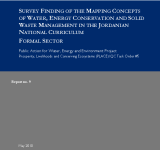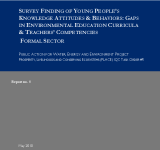The study aims to evaluate the concepts of water;; energy and solid waste that exists in the curriculum and the manner in which they are tackled by mapping the current textbooks based the three themes of the study – water;; energy and solid waste. The report is based on a comprehensive study of 104 school textbooks from grades 1 – 10 in fourteen subjects. The survey finds that the environmental education concepts were vastly covered in all subjects of he study in a total of 1777 concepts;; and most of them focused on scientific facts and information with repetitive energy concepts and lack of sequential flow. This research was conducted as part of the Public Action for Water;; Energy and Environment Project (PAP);; which aims to encourage water and energy conservation and to support behavior change towards more conservation and efficient practices both at the household level and in the commercial;; industrial and civil society arenas using social marketing behavioral methods. Based on the finding that there is little space allocated to the synthesis and application of information and knowledge and therefore the concepts remain superficially tackled;; the report recommends that support material should be prepared for the different grade levels and training programs should be developed for the teachers as real agent of change and role models.

